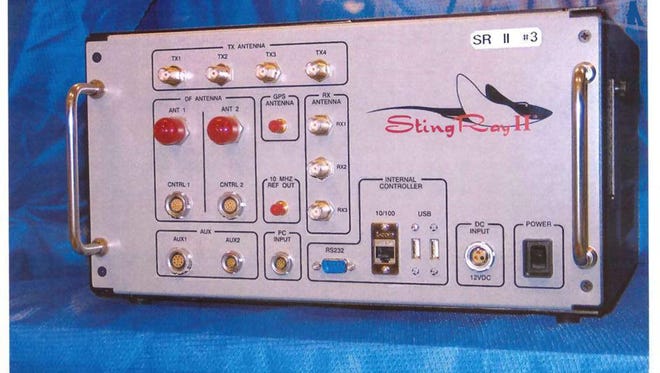Delaware lawyers raise questions about Stingray
Legislation as far back as 2012 sought to rein in high-tech surveillance tools

- Delaware lawyers are sorting how powerful Stingray devices are being used by law enforcement.
- The devices collect cell phone information from people nearby.
- Cases challenging the technology have sprung up in federal courts in states such as Wisconsin and California.
The murky nature of surveillance technology like Stingrays has caught the attention of Delaware defense attorneys. The mechanisms allow police to collect cell phone information from people nearby, even those who are not being targeted in an investigation.
In May, the devices were a topic during a training session organized by the National Association of Criminal Defense Lawyers at the Delaware Law School. A talk by Hanni Fakhoury, then an attorney at the San Francisco civil liberties group Electronic Frontier Foundation, was attended by about 100 lawyers, including State Public Defender Brendan O’Neill.
He said many Delaware attorneys didn’t even know that Stingrays existed, and defense attorneys at the session were advised to request documents about the devices whenever it appears the mechanisms were used.
“We’ll challenge them at every opportunity,” O’Neill said. “This is entering a world of big brother.”

Wilmington lawyer Tom Foley said defense attorneys are only beginning to learn which questions to ask. But he said an inevitable confrontation between his colleagues and the state police will likely prompt litigation in Delaware.
“You’re now going to ask (in court), ‘Was it an informant or was it a Stingray?' " he said. “A lot of these toys are legit for military use, but then they come here and we have to figure out” how they are used.
Cases challenging police use of the technology have sprung up in federal courts in states such as Wisconsin and California. A judge earlier this year also ordered the Chicago Police Department to provide information about its mobile phone tracking systems.
Several states, including Virginia, have created laws requiring police to get court orders to use the tools.
Delaware police can covertly collect cellphone data
In the city of Baltimore, defense lawyers pledged to review 2,000 cases involving Stingrays after it was found authorities weren’t transparent in court about how the technology was used. The use of the devices across Maryland later came under scrutiny.

Baltimore County Police Cpl. John Wachter told The News Journal that officers there only use the technology after a judge has signed off on the search.
“We do have cell-site simulators and have found them useful in investigations,” Wachter said. “We only deploy them after obtaining a court order based on probable cause.”
The fight over cellphone surveillance peaked this week when Apple CEO Tim Cook refused to help the FBI access the iPhone of one of the two perpetrators of the December mass-shooting in San Bernardino, California, that left 14 people dead.
Deputy AG: Use of 'stingrays' must be spelled out
Federal agents will no longer use 'Stingray' cellphone trackers without warrants
Cook said in a letter to customers that giving law enforcement a way to access a locked phone would weaken its security and put innocent customers' data at risk. Apple has until Tuesday to challenge the order in court.
Weakening phone security “would hurt only the well-meaning and law-abiding citizens who rely on companies like Apple to protect their data,” Cook said.
Bloomberg News on Friday reported that last November senior national security officials asked government agencies to search for ways to foil encryption software, and get access to cellphones and other devices. The National Security Council later issued a memo “tasking government agencies with developing encryption workarounds, estimating additional budgets and identifying laws that may need to be changed,” Bloomberg reported.
In Delaware, the technology concerned Daryl Scott as far back as 2012, when he served in the state House representing Dover. He introduced a bill that would have required court orders for any police search of a cellphone.
But opposition came from many state legislators who are ex-police officers, Scott said, as well as then-Attorney General Beau Biden. Without a paper record, police could use the tool to track non-criminal suspects for political reasons, Scott said. Ultimately, he couldn't convince his legislative colleagues to support the legislation.
"Privacy was a key issue that I focused on," said Scott, who did not seek re-election in 2014. "It isn't the government's business where I've been."
Contact Karl Baker at (302) 324-2329 or kbaker@delawareonline.com. Follow him on twitter @kbaker6.
